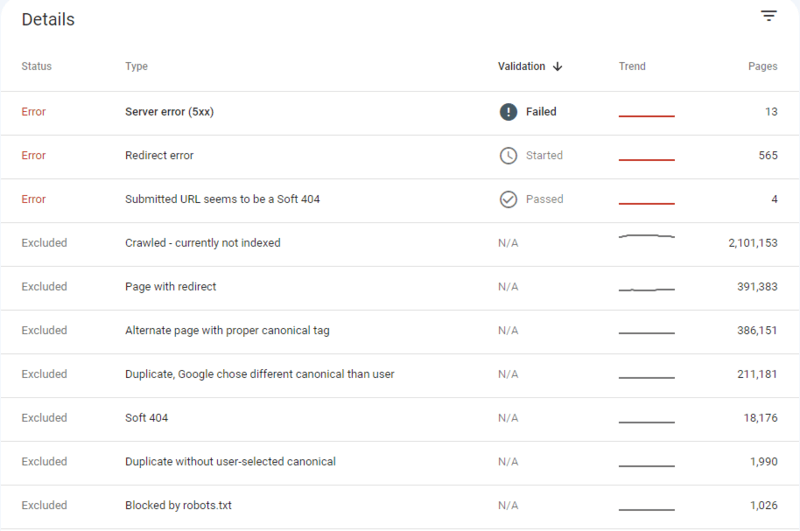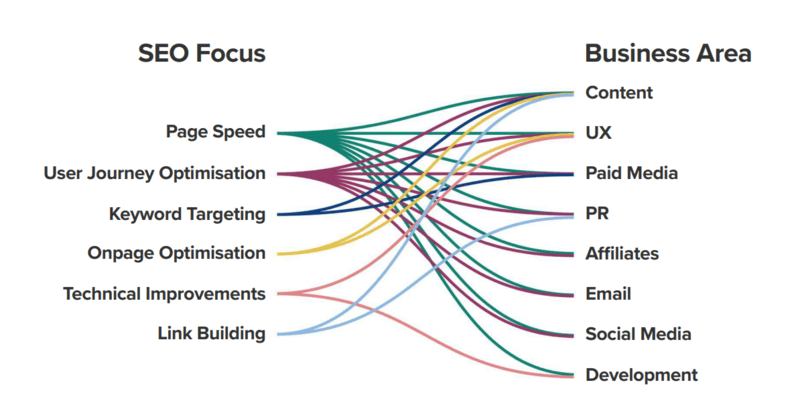Enterprise SEO – Strategies to Optimize Your Enterprise-Level Site
SEO has always been one of the pillars of digital marketing. But – let’s face it, optimizing a typical business website is one thing. Trying to optimize websites with tens of thousands of web pages and keywords is something completely different. That’s where enterprise SEO comes into the picture.
This guide will look into enterprise SEO and answer what enterprise SEO is, how does it differ from traditional SEO and how to implement enterprise SEO strategies to make big progress.
Let’s dive in.

Contents
- What is Enterprise SEO?
- How is Enterprise SEO Different Than Traditional SEO?
- Why Enterprise SEO Matters?
- How to Do Enterprise SEO: Top 10 Essential Tactics for Enterprise SEO
- 1. Building A Culture of SEO
- 2. Minimize Levels of Approval – Simplify The Process
- 3. Conduct a Thorough SEO Audit
- 4. Automation
- 5. Improve Crawlability and User Experience
- 6. Produce Quality Content at Scale
- 7. Focus on Enterprise-Level Link Building
- 8. Don’t Ignore Internal Linking
- 9. Competitive Research
- 10. Successfully Reporting SEO Results
- Get Your Enterprise SEO Program Started Today
What is Enterprise SEO?
Enterprise SEO is the process of focusing on SEO strategies that will improve organic presence and revenue for larger organizations (usually defined by the number of pages on the site). It provides a scalable strategic approach to improve the traffic revenues of the big players of the industry.
Generally, if your website has at least 1,000 web pages or products/services, you can consider it an enterprise site. Here are a few examples of the types of sites that might need enterprise-level SEO:
- Businesses that operate in multiple locations both nationally and internationally
- Ecommerce websites with over 10,000 pages
- Companies with annual revenue of over $1 billion
- Media publishers with thousands of articles
- Businesses with multiple subdomains or websites
- Fortune 500 and Fortune 1000 brands
How is Enterprise SEO Different Than Traditional SEO?
When you’re doing SEO for a bigger business, everything is magnified: problems, fixes, the time it takes to complete projects, and the impact of even small initiatives. Here are six key ways that make SEO for enterprise companies different from SEO for other businesses.
1. Scalability
Scalability is the major difference between enterprise SEO and traditional SEO. You’re not optimizing a few pages on a small business website. You’re doing SEO on a large website with thousands of pages, so it has to be scalable.
For example, imagine you have hundreds of product pages to optimize, and you need a lot of content for each product page and category page. Manually optimizing each page for an enterprise site isn’t going to cut it. Everything has to be scaled up.
That means your enterprise SEO strategy must include automation and workflow management to support operations. You also need a multi-disciplinary team of experts working across content, social media, PR, UX, design, and branding to truly scale content creation and execute complex SEO strategies.
2. Team Buy-In
Making a change (even a small one) on an enterprise site isn’t always easy to do.
That’s because an enterprise-level site usually has multiple people (and departments) all working on the site. This means that there will be multiple teams with different goals and KPIs, all competing for buy-in. Sadly, the fight for resource is where SEO can often be overlooked.
Publishing a new piece of content? That could mean brand teams, legal teams, compliance teams, product teams, and more who each need to have an input and sign it off.
Fixing what could look like simple technical SEO issues? This could mean weeks of working with developers to fit into their sprint, get buy-in on prioritization, or figure out the specific solution.
3. Manage Subdomains and Multiple Sites
Running an enterprise site requires SEO managers to manage subdomains and multiple domains in one central location. It’s a frightening task when you consider that it’s easy for larger websites with multiple subdomains to struggle with keyword cannibalization, finding and removing duplicate content.
4. Crawlability and Indexability
When you have tens or hundreds of thousands of site pages (or more), crawlability and indexability can become an issue too.
When you’re working with smaller sites, you don’t need to worry as much about these issues. And if there are problems, it’s usually a fix that can be done relatively quickly. However, enterprise SEOs need to worry about these two issues for their large-scale websites.
As critical technical SEO factors, crawlability and indexability can make or break your site’s visibility, regardless of your backlink profile or the amazing content you may have.
The challenge is that large sites can be difficult for search engines to crawl and index in cases where the crawl budget isn’t being optimized. Add in pages that sit many levels deep into a site, duplicate content, canonicalization issues, keyword cannibalization issues, crawl errors, orphan pages, and more. It’s easy to see how crawling and indexing become more difficult on large sites.
While there’s no denying that these factors are important for any site, the scale of these can extrapolate on larger sites.

5. Legacy Site Issues
If you’re working on an enterprise site, you’ll find that legacy issues quickly become far more apparent than when working on traditional SEO projects.
Enterprise SEOs are often faced with the challenge of having to work with complex legacy tech stacks and unwieldy websites with years’ worth of platform alterations, code additions and URL restructuring. Worse, Enterprise SEOs also often need to unpick the context behind certain issues without being able to speak to anyone who was involved in their rollout at the time.
Legacy issues and poor technical foundations can really impact an SEO’s efforts to do their job and ‘move the needle’ in terms of performance.
6. Reputation Management
When bad reviews, news stories, and other negative content ranks highly for branded searches, it can mean a major loss in revenue for the brand. Where the average small business doesn’t have to worry about this too much, enterprise SEO makes it a priority.
Reputation management for enterprise clients extends beyond a brand’s image to include key figures at the company and even celebrities representing your brand. There has to be a holistic approach for online reputation management to work.
No matter how good your PR team is, you need a sophisticated SEO strategy to serve up more accurate SERPs. That’s another aspect of enterprise SEO: undoing the damage caused by unfair claims.
Why Enterprise SEO Matters?
Enterprise SEO is important because strategies that work for smaller businesses won’t work for larger ones. And if executed correctly, enterprise-level SEO can achieve incredible results: massive influxes of traffic and new leads, countless conversions and sales and increased brand recognition.
How to Do Enterprise SEO: Top 10 Essential Tactics for Enterprise SEO
Now that we’ve outlined some of the main challenges in enterprise SEO and why enterprise SEO is important, let’s explore some essential tactics which can help you achieve success for the enterprise websites you manage.
1. Building A Culture of SEO
No matter the flawlessness of your planned SEO strategies, these will struggle to properly get off the ground if you have limited resources and no prioritization.
Therefore, the most important place to start to be able to succeed in enterprise environments is to build a culture of SEO. This involves educating stakeholders and your colleagues about the importance of SEO.
To get others to care about and buy in to SEO, they need to:
- Understand what it is
- Understand why it’s important
- Trust you as an authority
- Want to work with you
To begin the process of building a culture of SEO, you first need to build credibility and respect within your company by proving yourself to be the go-to resource for anything SEO related.
Then, take the time to bring people on board by educating them about the importance of SEO and how it can be valuable for the business to follow best practices. Stakeholders won’t buy in to a project if they don’t understand it, care about it or believe in its value.
During your education process, you need to make sure that internal teams know:
- How SEO can impact them.
- How they can impact SEO

Getting others on your side will be much easier if you commit to SEO education and helping them understand why you need whatever it is you’re asking for, and then sharing how they in turn helped your project to achieve success.
2. Minimize Levels of Approval – Simplify The Process
Any large company has multiple levels of submission and approval. To create an efficient SEO plan for enterprise you should minimize the number of people and levels that SEO content & decisions must go through.
Pick one person to be the main point of contact & the decision maker for SEO. This will help to move projects along faster and without too much interference.
3. Conduct a Thorough SEO Audit
If you want to get the best results from your enterprise SEO campaigns, then you need to conduct an SEO audit.
You must create an audit checklist that will help your team conduct the audit analysis hassle-free. You can divide your checklist into different parts such as a technical SEO audit, content audit, and link audit. This will help you to complete your audit without skipping anything.
Generally, an SEO audit is a vital activity that you need to understand what needs to be done to improve an enterprise website performance.
4. Automation
When it comes to SEO for enterprise companies, automation is key to achieve greater scalability.
Imagine receiving a spreadsheet with 5,000 products. Could you create content one by one for all these items? Even if you could, it would be very hectic and time-consuming.
That’s where automation comes into the picture.
Automation can help with SEO tasks like keyword research, identifying problematic areas on your site, monitoring the quality of backlinks, analyzing title tags and meta descriptions, and more.
Many Enterprise SEO tools can help you automate these process in bulk and improve your efficiency to manage websites with millions of pages and keywords. Here are some of them: Google Search Console, Ahrefs, SEMRush, ScreamingFrog, and W3C Validator.
5. Improve Crawlability and User Experience
The first step to showing up in search engines is to get your content indexed on the search engine.
When you have thousands of pages on your website, how do you ensure they’re all indexed on your website?
Here are a few things that can help improve your site’s crawlability:
- Eliminate any technical issues that hamper the crawlability and quality of your websites, such as page speed, XML sitemaps and incorrect robots.txt.
- Make it easy for your visitors to navigate through your website.
- Your home page shouldn’t be more than three clicks away, irrespective of how deep on your website the visitor is.
- Delete or No-index older unimportant pages from your website.
- Do proper internal linking on your website.
- Use 301 redirects when deleting old pages to ensure that your visitors don’t see error signs.
- Add a search bar on your website along with an autocomplete option. This will make it easier for your site visitors to find products on your website.
6. Produce Quality Content at Scale
No amount of content is too much.
Whether you run a single page or millions of pages, content is still a vital part of ranking high on search engines. The difference here is that you’re producing content on a large scale.
This can pose a challenge to ensure quality content on thousands of your website pages. Whether it’s creating new engaging content or updating your already-indexed pages, it’s quite difficult.
In this case, you need solid systems and processes for onboarding, training and editing. Arguably the most important of all though, is providing excellent content briefs.
7. Focus on Enterprise-Level Link Building
As a business enterprise company, you might already have plenty of high-quality links from trusted sites in your industry. But that doesn’t mean you should stop focusing on acquiring backlinks.
You can tap into the same set of link building strategies that any website can. But do you know that you have a few opportunities for building backlinks that many sites don’t? For example, enterprise sites can often build links at scale from unlinked brand mentions.
8. Don’t Ignore Internal Linking
When you constantly update your content on a large website, it’s easy to forget the old content. One way to ensure that your old content remains significant is to use internal linking.
On a small site, you can manually add or optimize internal linking. However, for internal linking to work on an enterprise site, you need to scale things up.
You might need to set up an SEO-friendly site structure that automatically generates internal links between different areas of the site.
Or you may need to create a small script that automatically adds internal links to important pages.
Either way, it’s unlikely that you’ll be able to scale internal linking on an enterprise-level site manually.
9. Competitive Research
Another strategy that helps you win at enterprise SEO is keeping track of what your competitors are doing.
Spying on your competitors’ online activities will reveal their ranking keywords, help you to spot content gaps, and unveil many link-building opportunities. Then, you can recreate these links, keywords, topics, and other strategies to outrank your competitors.
10. Successfully Reporting SEO Results
To be able to get more resource allocated to SEO in the future and get even more of your fixes implemented, you’ll need to prove its value. One of the best ways you can communicate this is through reporting.
Here are some of the things to consider when creating reports for your colleagues and stakeholders:
- Show how SEO is performing, including which efforts are working and where there are opportunities for growth.
- Automate this process where possible through dashboarding.
- Integrate data sources into tools like Google Data Studio for easy management of large website portfolios.
- Use tool APIs where possible to get access to more data and be able to customize the way you use it.

Get Your Enterprise SEO Program Started Today
Enterprise SEO isn’t easy; it comes with its own set of unique challenges around managing large datasets and navigating complex organizational team structures. This requires high-level SEO strategies to find traffic opportunities, strong analytical skills to collect and interpret data, and interpersonal skills to build internal relationships and get things done.
Despite these challenges, creating an enterprise level SEO program is a worthwhile task. Successful enterprise SEO is critical to ensuring high rankings and to bringing potential buyers to an enterprise website where they can be nurtured through the sales pipeline toward conversion.
